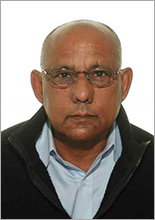Water Consumption in Agriculture
While the population explosion and excess personal usage strain water supplies across the Arab region, a second source of water stress is that of agriculture. Agriculture is the major driver of economy and food security and employs over 21 percent of the population in Middle East and North African (MENA) countries. Most MENA countries use 75 percent to 90 percent of their water resources for the agricultural sector. All countries are net importers of food. No one knows better than MENA farmers that agriculture depends on water. Because the region is prone to drought, lack of water often limits the production of food crops. As a result, farmers often rely on irrigation to provide sufficient water for agricultural needs. In arid areas, crop production is not possible without irrigation. In semi-arid areas, irrigation increases crop yields and quality. For many farmers in the MENA region, irrigation is essential and will continue to be so, especially during periods of erratic rainfall and drought. However, with declining water supplies in many countries of the region and the escalating need to conserve water, food producers must address the challenge of managing irrigation as efficiently as possible.
To irrigate effectively, the right amount of water has to reach the right place at the right time. Generally, greater amounts of are water are applied through a gravity system than with sprinkler and micro-irrigation systems. Conservation is an important part of meeting agricultural water demand in the future. Water use can be reduced substantially without decreasing productivity through improved irrigation technologies and efficient water management practices. With effective new technologies, farmers can determine how much water is needed to maximize crop production while minimizing water waste.
Accurate water measurement and soil moisture monitoring are key components of efficient on-farm water management practices. Some of the new technologies for preparing agricultural fields for efficient water use are:
- Laser Leveling: Laser-controlled land leveling equipment which grades fields to contour the land for different irrigation practices;
- Furrow Diking: Furrow diking conserves water by capturing precipitation or irrigation water in small earthen dams within furrows;
- Tailwater Reuse: Tailwater, or runoff water, should be minimized as much as possible through soil monitoring and irrigation methods that reduce runoff;
- LEPA (Low Energy Precision Application) and LESA (Low Elevation Spray Application): LEPA and LESA systems concentrate water on a smaller area and increase the water application rate for the area covered.
- Surge Flow: Surge flow irrigation applies surges of water intermittently rather than in a continuous stream;
- Drip Irrigation: Applies small amounts of water frequently to the soil area surrounding plant roots through flexible tubing with built-in or attached emitters.
The stress of droughts in the MENA region, higher farming expenses and low international commodity prices will continue to make efficient water management practices a necessary tool for farmers who wish to remain competitive in today’s globalized market.
Having examined three of the main drivers of water consumption across the region, the next sections take a deeper dive into regulation, tariffs and improving efficiency through public sector participation.
Shibu B. Dhar provides consulting services to multilateral banks (The World Bank, Inter-American Bank, Asian Development Bank and European Development Bank), bilateral development agency, USAID and private infrastructure clients. He has extensive experience in the reform of water companies in the developing countries, including the management of regulation, the development of commercial targets, and performance management systems. His experience includes design of institutional frameworks, design and review of appropriate regulatory bodies in the water sector, which has been gained through assignments in Cape Verde, Zambia, Latvia, Vanuatu, Mongolia, India and USA.
